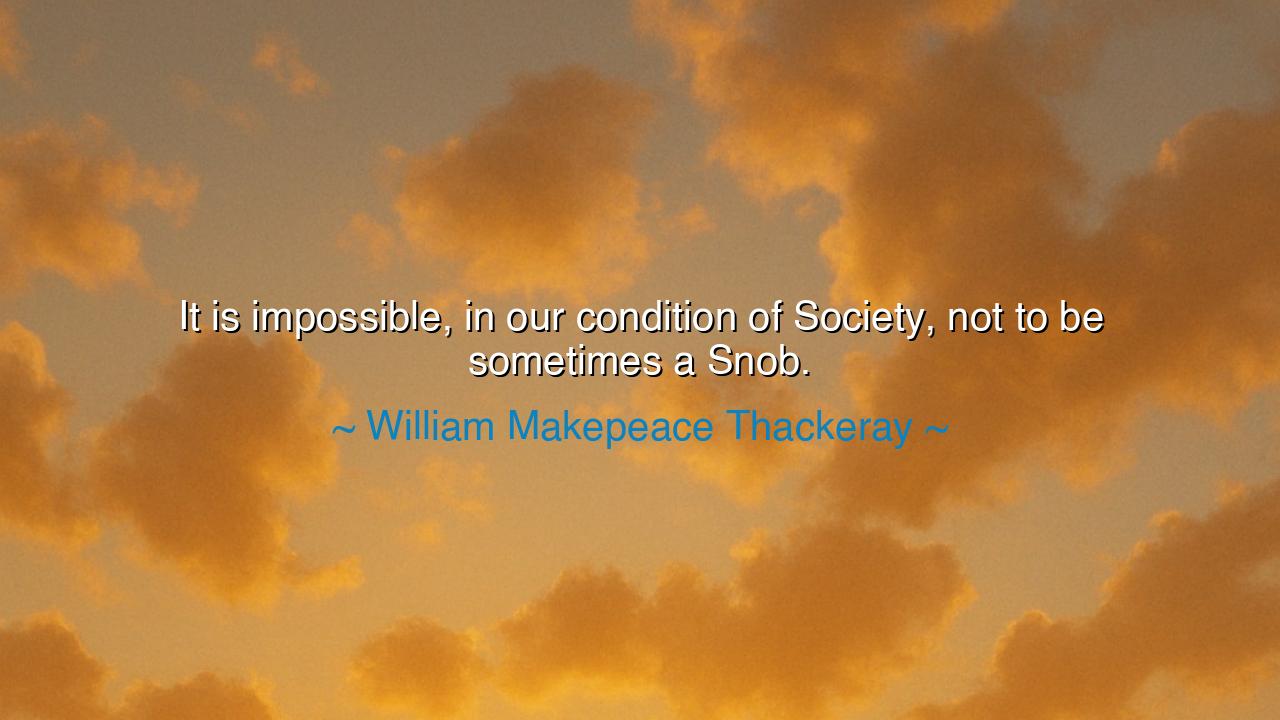
It is impossible, in our condition of Society, not to be






Hear now the wry yet piercing words of William Makepeace Thackeray, who in his book The Book of Snobs laid bare the follies of men: “It is impossible, in our condition of Society, not to be sometimes a Snob.” These words, though light in tone, strike with the sharpness of truth. For Thackeray, with the keen eye of a satirist, saw that no man is free from the temptation of pride, of vanity, of looking upward with envy and downward with disdain.
In the England of Thackeray’s time, class was the great idol before which millions bowed. Titles, wealth, and birth dictated respect far more than virtue or wisdom. The nobleman, no matter how foolish, was revered; the tradesman, no matter how worthy, was scorned. Thackeray saw this spirit not only in the rich, but in all levels of Society—for the poor often worshiped the rich even as they resented them, and the middle class mocked those beneath while currying favor with those above. Thus he declared it “impossible” not to fall into snobbery at times, for the very structure of Society trained people into it.
Consider, O listeners, how this truth has repeated across the ages. In ancient Rome, senators paraded their lineage while sneering at freedmen who had won fortune by trade. Yet those same freedmen would in turn flaunt their wealth before slaves and beggars, repeating the chain of scorn. In the French court of Versailles, courtiers jostled for the privilege of holding the king’s glove, bowing and scraping for trifles of honor, all while despising those not admitted into their golden cage. These examples show what Thackeray meant: the air of Society, thick with hierarchy, tempts every soul to become a snob.
Yet let us not mistake Thackeray’s words as excuse, but rather as mirror. To say it is “impossible not to be sometimes a snob” is not to glorify it, but to warn us of our weakness. Pride creeps in when we least expect it—when we boast of our learning, when we scorn the unrefined, when we covet the company of the wealthy, or when we exalt our taste as finer than another’s. The danger lies not only in the nobles and the rich, but in every heart that forgets humility.
The meaning, then, is clear: snobbery is not the disease of the powerful alone, but of mankind itself. It is the natural shadow cast by Society, which measures men by outward rank and possession rather than by inward worth. Thackeray calls us to see this truth, to laugh at it, and in laughing, perhaps to rise above it. But to rise requires vigilance, for the temptation to be a snob never fully departs.
What lesson, then, must we carry? It is this: guard your heart against the worship of status. Remember that every soul, whether clothed in silk or rags, shares the same dignity of humanity. Do not scorn the humble, nor flatter the proud, nor measure yourself by the scale of wealth or fame. Instead, seek character, seek kindness, seek wisdom. These are the marks of true greatness, which no title can bestow and no poverty can diminish.
In your own lives, when you feel the urge to look down on another, pause and ask: “Am I not also guilty of folly? Do I not also crave recognition?” And when you feel the pull to flatter the powerful for gain, ask: “Does this honor me, or diminish me?” By such questions, you may break the chain of snobbery that Thackeray so vividly exposed.
Thus remember his words: “It is impossible, in our condition of Society, not to be sometimes a Snob.” But though it may be impossible never to stumble, it is not impossible to rise. Let us stumble less, laugh at our vanity when it appears, and strive always for humility, that true measure of the soul, which stands above all ranks and endures beyond all ages.






AAdministratorAdministrator
Welcome, honored guests. Please leave a comment, we will respond soon